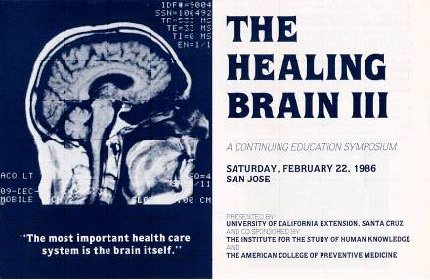Healing Brain Seminar: February 1986
THE HEALING BRAIN III
A Continuing Education Symposium
Saturday, February 22, 1986
San Jose
Presented by
UNIVERSITY OF CALIFORNIA EXTENSION, SANTA CRUZ
and Co-sponsored by
THE INSTITUTE FOR THE STUDY OF HUMAN KNOWLEDGE
and THE AMERICAN COLLEGE OF PREVENTIVE MEDICINE

The brain minds the body, and states of health and disease are profoundly influenced by states of mind.
This symposium will present some of the recent advances in the brain and behavioral sciences which shed new light on the vital role of the brain as a health maintenance organization. We have a brain which contains many “small minds.” The function of the brain may be influenced by our diets. Emotions have profound effects on our physiology and emotional changes, like those associated with lying, can sometimes be healthy, sometimes unhealthy. The brain even produces its own opiate-like chemicals with striking effects on pain perception, mood, and thought.
These and other findings of major clinical importance will be explored at a one-day symposium by a distinguished faculty of researchers and clinicians. They will provide an up-to-date review of emerging trends in behavioral medicine.
LECTURES
Multimind
Robert E. Ornstein, Ph.D.
We do not have a thoroughly modern mind although we live in a thoroughly modern world. We have a multiple one. We have a complex and unorganized collection of special-purpose solutions to meet different circumstances. We have small minds for reacting to emergencies, for detecting sharp changes in the environment, and many “minds of the body” which control health. The brain contains several different and independent centers of action each of which has a “mind of its own.” There are significant problems for the maintenance of our health when our separated small minds disagree.
Food For Thought: The Influence of Nutrition on Brain and Behavior
Marion Nestle, Ph.D.
While deficiency of almost any essential nutrient can damage the brain and alter behavior, can manipulation of the diet improve the way apparently well-nourished people feel and act? A critical review is presented of the current evidence on whether specific dietary factors can prevent or treat such conditions as depression, hyperactivity, insomnia, Alzheimer’s disease, and mental retardation. Current research also suggests ways that healthy diets can maximize good mental health.
Emotions, Moods, Traits, and Emotional Disorders
Paul Ekman, Ph.D.
Current understanding of moods, emotional traits, and emotional disorders will be reviewed along with the latest techniques for generating and exploring the physiology of emotions. Anger, irritation, hostility, aggression, and violence are overlapping terms often used to describe the same actions. We should try to distinguish among them. Anger is not unhealthy, but hostility may be. Aggressive people may never be violent, and violence may not involve anger. Everyone becomes sad, while only people with serious psychiatric problems have a depression. What the emotions feel like, what they look like, what they sound like, and what causes people to feel them will be illustrated.
Lying About Feelings and Feelings About Lying
Paul Ekman, Ph.D.
Emotions play a crucial role in lying. It is not just that we often lie about how we feel, but even when our lie is not about feelings, our feelings about lying (fear and guilt) can betray our lie. Why do lies fail or why do they succeed? How can we spot clues to deceit and when won’t there be any clues? Is lying always bad or is it sometimes healthy to lie? While lying is a commonplace activity, part of almost everyone’s life, there are some illnesses which involve extensive lying.
Endorphins: The Brain’s Natural Opiates and Mental Health
Philip A. Berger, M.D.
One of the most exciting discoveries in neurochemistry is that the human brain produces chemical compounds called endorphins, which have pharmacological activity identical to morphine and other opiates. An enormous scientific effort is currently underway to identify the structure, location, and function of these natural opiates. Endorphins may be involved in the perception of pain, positive reinforcement, schizophrenic hallucinations, and perhaps runners’ high. The current evidence on the role of endorphins in normal and abnormal moods and behaviors will be explored.
FACULTY
Philip A. Berger, M.D., is the Kenneth T. Norris, Jr. Professor of Psychiatry and Behavioral Sciences, Stanford University School of Medicine and Director of the Norris Mental Health Clinical Research Center. His major research interests include the neurobiology and neurochemistry of mental illness about which he has written numerous scientific papers. In addition, he is co-editor of several books on psychopharmacology, psychiatry, and behavioral neurochemistry.
Paul Ekman, Ph.D., is Professor of Psychology and Director of the Human Interaction Laboratory, Department of Psychiatry, University of California San Francisco. His major areas of research include nonverbal communication, facial expressions, and human emotions. He is author of numerous scientific papers and books including Telling Lies and Emotion and the Human Face.
Marion Nestle, Ph.D., is Associate Dean, School of Medicine, Director of the John Tung/American Cancer Society Clinical Nutrition Education Center, and Associate Professor of Family and Community Medicine at the University of California San Francisco. She has been very active in nutrition education programs for medical students, physicians, and other health professionals. She is also author of Nutrition in Medical Practice.
Robert E. Ornstein, Ph.D., is Visiting Professor of Human Biology at Stanford University and President of The Institute for the Study of Human Knowledge. His research interests include the function of the two hemispheres of the brain, perception and communication in the human sciences. He is author of numerous books, including The Amazing Brain, The Psychology of Consciousness, Psychology: The Study of Human Experience, and The Mind Field.
Course Coordinator
David S. Sobel, M.D., is Medical Program Director for the Institute for the Study of Human Knowledge and Director of Patient Education and Health Promotion for Kaiser Permanente Medical Care Program in Northern California.
